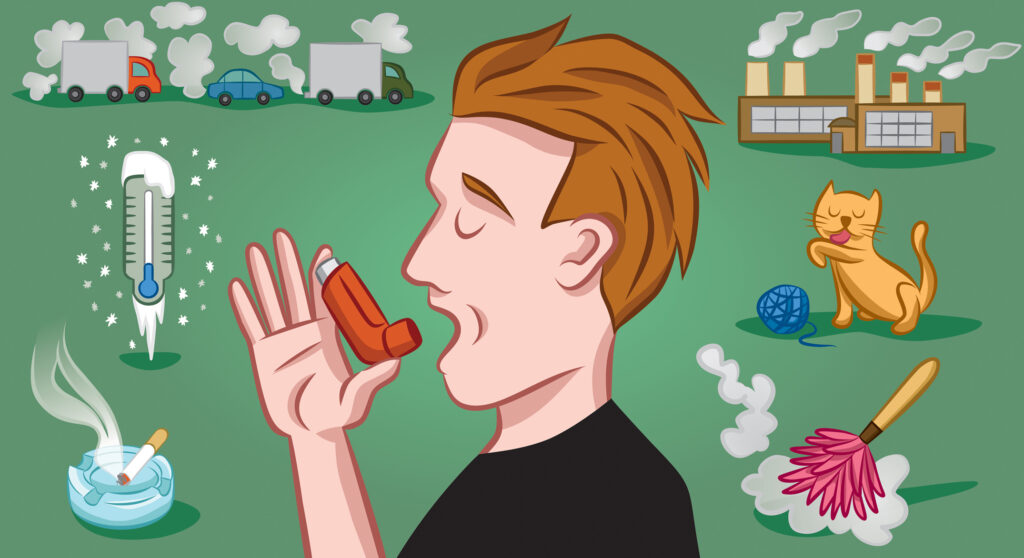An asthma attack may cause coughing, wheezing, trouble breathing as well and the feeling of tightness in the chest. Patients can combat mild asthma attacks caused by medications for bronchial asthma together with an inhaler. However, those who experience extreme symptoms of an asthma attack bronchial should seek medical attention as soon as they can.
A rash of allergies occurs while muscles across the airways contract and narrow the airways. The result is a variety of symptoms consisting of breathing problems, shortness of breath, tightness of the chest area, wheezing, and general breathing issues. There is a variety of information about Asthalin Tablets such as Iverheal 12 mg as well as Iversun 12mg Dosage.
Certain triggers, comprised of allergens, irritating substances in the air, or smoke could trigger an allergy attack.
It is also possible to identify an asthma attack as an exacerbation of asthma bronchial or an asthma attack.
The symptoms of an attack on allergies
The symptoms and signs of an asthma attack may vary, based on the intensity of an attack. A minor bronchial asthma attack may last only a few of minutes, however at the same time severe allergies can last for hours and even days.
The indicators of an upcoming attack of allergies may comprise:
- an increased need to asthma medicine to treat it, in particular, albuterol
- an increase in cough
- feeling being short of breath, especially when it causes the individual to wake from the sleep
- decreased tolerance to exercise
The signs that someone is suffering from an asthma attack that is bronchial could be composed of:
- wheezing
- The chest is a ringing noise
- the feeling of tightness in the chest or the sensation that one is sitting on their chest
- rapid breathing
- difficulty in breathing fully
- coughing
- issue talking
The signs of an intense attack on allergies could include:
- rapid breathing, causing your skin “suck in” around the chest or between the ribcage while breathing.
- changes in skin coloration and pores around the eyes, lips fingers, and nail beds. This can appear white or gray on dark skin tones and blueish or crimson on lighter pores and skin
- the rapid movement of the nostrils
- Deep and rapid in-and-out movements of the belly or ribs
- the chest multiplied, it doesn’t deflate anymore on breathing out
- in infants who have allergies, they do not react to or the popularity of their caregivers or parents
A severe asthma attack can cause coughing, wheezing, trouble breathing, or tension in the chest. It is possible to manage minor allergic attacks by taking a bronchial asthma medication, comprising of the inhaler. But, anyone who is experiencing extreme symptoms of an asthma attack that is bronchial should seek medical attention immediately.
A hay fever attack occurs when muscles in the airways are settling and narrow the airways. The result is shortness of breath, tightness in the chest cavity, wheezing and a variety of other symptoms that are common to respiratory problems.
Certain triggers, in addition to allergens and irritating substances in the air or smoke could trigger the onset of asthma bronchial.
There is a possibility of discussing an asthma attack that is bronchial as an exacerbation of bronchial asthma or asthma attack.
In this document we will explain how to identify the signs of an allergy attack and what you should do when you are experiencing an allergic attack, and the best time to seek out medical assistance.
The signs of the asthma attack
The signs of asthma attacks may vary, based on the degree of the attack. An asthma attack that is mild may take a couple of minutes however, as an extreme asthma attack can last for days or even hours.
The warning indicators of an imminent asthma attack may comprise of:
- An increased requirement to apply the rescue allergy medication, notably albuterol
- an increase in cough
- being short of breath, particularly being a cause of the person or woman to feel tired and shaky, especially if it is causing the person or woman
- decreased tolerance to exercise
- The signs that someone is suffering from an allergy attack can include:
- wheezing
- The chest is a roaring sound
- chest tightness or the feeling that there is someone sitting on your chest
- quickening respiratory
- trouble breathing completely
- coughing
- problem talking
The signs of an extreme allergic attack may include:
- fast breathing, which causes on the body to “suck in” across the chest or between the ribcage while breathing.
- modifications in changes in the skin and pores on the lips, eyes and fingertips as well as nail beds. These changes can appear white or gray on dark skin, and blueish or red on lighter pores and skin
- the rapid movement of the nostrils
- the powerful and fast in-and-out motion of the belly or ribs
- The chest is accelerated, and will not be deflated on breathing out
- in infants with allergies, they have no reaction or their reputation in their caregivers or parents
Summary
The asthma attack can occur when muscles around the airways relax which makes it harder to breathe. Patients may exhibit symptoms that include coughing, wheezing and chest tightness and changes in their breathing patterns.
It is usually feasible to manage a mild asthma attack using remedies as well as a quick-appearing inhaler.
Anyone suffering from a serious asthma attack in the bronchial tract will require immediate medical attention and the treatment as soon as is feasible.



